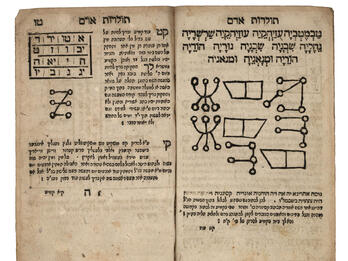Mikveh Yisra’el (The Hope of Israel)
The initial premise of our argument—and the matters of which we speak are of ancient provenance—is that love can be divided into three categories, which are: the love of something beneficial, the love of something pleasant, and the love of the good, simply because it is good. Now it is a well-known fact that the defect inherent within the first two categories of love is that, once the reason for them no longer applies, they too will evaporate. And the sage [Aristotle] has stated likewise in his book of ethics, “. . . those who love [another person] for the sake of obtaining benefit from him will not desire good things for their beloved one by virtue of the fact that he is loved, but they will, however, desire good things for the one loved because of the benefit that they will obtain from the beloved.” Hence he clearly explains the deficiency and the unworthy element inherent in those types of love which exist on account of a particular cause, which are not to be found in the case of the third type of love, for it constitutes a love for that which is good, because he regards it as good and of superb quality—and he loves it exclusively for that reason.
There is, however, a crucible and a smelting furnace available [so to speak], enabling one to distinguish love which is truly faithful, based on no ulterior motive whatsoever. This is where the one who loves is perfect in regard to every aspect of perfection to be found on earth. In that case, it is most certainly appropriate to conclude that whomever this perfect individual has loved, it must have been with a mighty love, since it is not dependent upon anything, as he is perfect in every way and has no need of anyone else besides himself. [ . . . ]
The second premise is as follows: It is well known and publicly acknowledged that the Almighty faithfully loves the chosen people, the seed of Abraham, who loved Him, more than He does all the other nations; and this is something perceptible throughout all the Holy Books, and in particular Malachi: “I have loved you” says the Lord; yet you say: “In what way have You loved us?” “Was not Esau a brother to Jacob?” says the Lord; “yet I loved Jacob. But Esau I hated, and made his mountains a desolation. . . .” The prophet is saying that notwithstanding the fact that Esau was the brother of Jacob, and such fraternal relationship dictates that they should each receive the identical portion and inheritance, nonetheless the practice of the Holy One is not like that of flesh and blood. For the practice of flesh and blood is that both a son who is a cause of shame to his father, and a beloved son, will get their father’s inheritance divided equally between them. [ . . . ] However, the Holy One does not look with favor upon the arrogant or a fraternal relationship which is diseased, but rather upon straightforwardness and perfection of character, and He will confer benefits on those who are worthy of it, for the entire earth belongs to Him. This, then, is the meaning of the verse: ‘“Was not Esau the brother of Jacob?’ says the Lord, ‘yet I loved Jacob”’—to cause him to inherit a delightful land and the heritage of hosts of nations. [ . . . ] Now that being the case, there can truly exist no mightier love [for Jacob’s descendants] than this.
And furthermore, Rabbenu Nissim [of Girona (ca. 1310–ca. 1380)], of blessed memory, has stated in his discourses that this is the reason why the chief of our enemies, and the destroyer of our country, and the one who slew so many of us, was Esau and his descendants, and this is due to the fact that he came with a hatred bred of jealousy; for he was the son of Isaac’s proper wife, just like ourselves, which is not the case with the other nations. [ . . . ] However, the descendants of Esau, who was the son of a proper wife and who was descended from Abraham, were extremely jealous, and on that account they are the quintessential foe, but the Holy One, on account of His love for us, saves us from their hands. And our sages of blessed memory have declared in addition that the Holy One created His world only for the sake of Israel—as they, of blessed memory, declared, “In the beginning—it was for the sake of Israel, who are referred to as ‘the first,’” that He created the heavens and the earth. And it was on account of the great love that He bore for them that He gave them a Torah and commandments, so as to enable them internally to acquire the most distinguished traits of character. And this is certainly due to the mighty love which he had for them, which constitutes the third category of love. For the first two categories of love would not fit here on the basis of the premise with which we commenced, for most assuredly, where one who is perfect is concerned, his love will be a genuine love‚ and there is none as perfect as the Holy One, blessed be His Name, and all perfect things emanate from Him.
Translated by
.
Credits
Israel (ben Moses) Najara, Mikveh Yisra’el (The Hope of Israel) (Ramat Gan: Bar Ilan University, 2004), pp. 131–132.
Published in: The Posen Library of Jewish Culture and Civilization, vol. 5.





